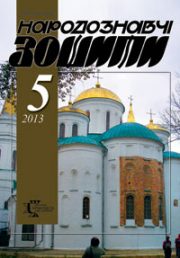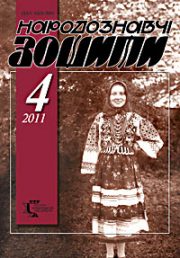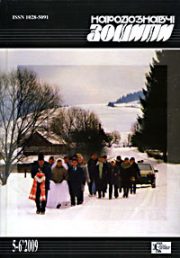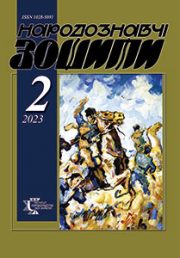The Ethnology Notebooks. 2021. № 5 (161), 1261—1266
UDK94:271.2-535.3(477.41)”18/1917″
DOI https://doi.org/10.15407/nz2021.05.1261
FROM THE HISTORY OF THE KYIV MYKHAILIVSKYI ZOLOTOVERKHYI MONASTERY CHOIR (XIX — EARLY XX CENTURIES)
PEREPELIUK Olha
- ORCID ID: https://orcid.org/0000-0001-7261-5811
- PhD (History), Lecturer, Research Assistant,
- Pavlo Tychyna Uman State Pedagogical University,
- 2, Sadovaya Str., 20300, Uman, Ukraine,
- Contacts: e-mail: perepelu4ka@gmail.com
Abstract. Introduction. The Church choristers are direct participants in the service, and an integral part of the clergy, therefore, it is important aspect, while studying the history of famous Orthodox monasteries. In the published studies on the history of the Kyiv Mykhailivskyi Zolotoverkhyi Monastery, there is practically no mention of choristers, although for a long time there was a metropolitan see at the monastery and, accordingly, the most prestigious church choir of the Kyiv eparchy.
Problem Statement. The article analyzes archival materials and recent publications concerning various aspects of the activities of the Kyiv Mykhailivskyi Zolotoverkhyi Monastery choristers from the XIX — early XX centuries. A feature of scientific research is the absolute lack of development of this topic.
Purpose.All archival documents were to be processed for the first time. A complex approach became the methodological basis of the research. An important role in the work was played by prosopographic and statistical methods, as well as the principles of dialectics, historicism, logical-analytical, and logical-critical analysis.
Methods. The historical and cultural approaches, as well as professional art criticism (musicological) research methods, became the main ones in solving problems.
Results. The obtained results’ weight lies in highlighting the unique facts from the history of the monastery choir — data on the quantitative composition of the choristers at different times, their personification, the names of the choir directors, metropolitans, who were engaged in their choristers, as well as all those involved in the choir activities.
Conclusion.The preserved financial documents are analysed, which contain information on the choristers’ salaries, the cost of tailoring, and types of clothing, food, and training. The conducted research makes it possible to supplement information about one of the main monasteries in Kyiv, fill in the «blind spots» in its history, and add new personalities or previously unknown facts about the already mentioned clergy.
Keywords: church choir, the Kyiv Mykhailivskyi Zolotoverkhyi Monastery, Orthodox Church, funding for choristers, XIX — early XX centuries, Kyiv.
Received 26.09.2021
REFERENCES
- Klos, V. (2007). History of St. Michael’s Golden-Domed Monastery. Kyiv: Ghrani-T [in Ukrainian].
- Kryvosheia, Ir. (2020). The Kyiv Metropolitan Choir in the XIX century: reconstruction of choirmen’s clothes. Scientific Papers of the Vinnytsia Mykhailo Kotsiubynskyi State Pedagogical University. Series: History (Issue 33, pp. 83—89). DOI: https://doi.org/10.31652/2411-2143-2020-33-83-89 [in Ukrainian].
- (1843). The Case of the Singings Metropolitan Choir. CSHA of Ukraine (Central State Historical Archive of Ukraine, Kyiv). F. 169. Op. 2 (sp. 5, § 14). Od. save 7. Arc. 1—5 [in Russian].
- Khyzhnjak, Z. (2013). Falkovsky Ivan Jakymovych. Encyclopedia of the History of Ukraine (Vol. 10).Kyiv: Naukova dumka [in Ukrainian].
- (1850). Commodity check for products for the abbot and singers of the Kyiv-Mikhailivsky monastery. CSHA of Ukraine (Central State Historical Archive of Ukraine, Kyiv). F. 169. Op. 8. Od. save 13. Arc. 1—4 [in Ukrainian].
- (1875). Notebook for recording the progress and behavior of students of the monastery choir for 1875. CSHA of Ukraine (Central State Historical Archive of Ukraine, Kyiv). F. 169. Op. 6. Od. save 258. Arc. 1—14 [in Russian].
- (1810). The case of the confirmation of the singer Grechinsky as regent. CSHA of Ukraine (Central State Historical Archive of Ukraine, Kyiv). F. 169. Op. 1. Od. save 30. Arc. 1—2 [in Russian].
- (1827). The case at the request of Ivan Orlov, a student of the lower Department of the Kiev Theological Seminary, to accept him as a reagent into the singing choir of His Eminence. CSHA of Ukraine (Central State Historical Archive of Ukraine, Kyiv). F. 169. Op. 7. Od. save 33. Arc. 1—10 [in Russian].
- (1832). The case of the change of the choir directors of the Metropolitan Choir in the Mikhailovsky Monastery. About the publication of music books and notebooks, other things belonging to the singing choir according to the inventories. CSHA of Ukraine (Central State Historical Archive of Ukraine, Kyiv). F. 169. Op. 2 (sp. 5, § 14). Od. save 1. Arc. 1—13 [in Russian].
- Mukha, A. (2004). Composers of Ukraine and the Ukrainian Diaspora: Handbook. Kyiv: Muzychna Ukrajina [in Ukrainian].
- (1908). Choir director’s memorandum on the purchase of books for the choir library. CSHA of Ukraine (Central State Historical Archive of Ukraine, Kyiv). F. 169. Op. 6. Od. save 406. Arc. 1 [in Russian].
- (1911). The List for the Issuance of Salaries to the Choristers of the Bishop’s Choir For 1911. CSHA of Ukraine (Central State Historical Archive of Ukraine, Kyiv). F. 169. Op. 6. Od. save 1386. Arc. 1—20 [in Russian].







